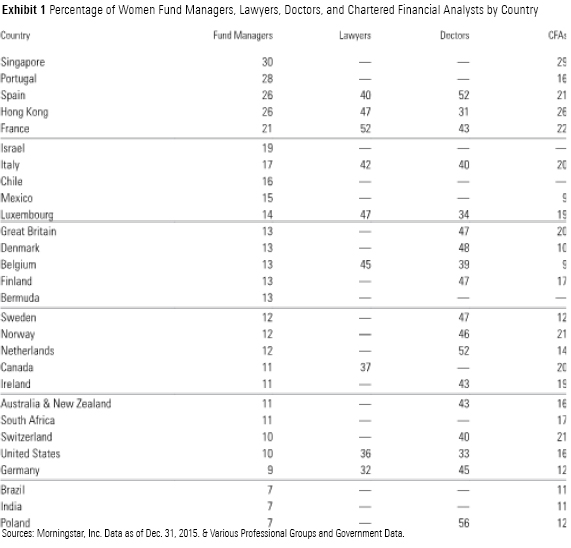It's a well known fact that fund management is not a business populated by women.
Morningstar began formally studying fund managers by gender in 2015 after observing first-hand over decades that there are disproportionately fewer women in the fund industry. Initially the study focused on 3 countries: U.S., Spain, Hong Kong. It revealed that women are vastly outnumbered by men in fund-management ranks not only in absolute terms but also relative to other professional industries, including law and medicine.
Last year, The Financial Times cited Morningstar data and stated that the belief that female fund managers are an endangered species has been reinforced by findings showing women run just 2% of fund management assets in the US.
(In the hedge fund world the story is the same. Leda Braga, the "queen of hedge funds", is a prominent exception and is the first woman ever to have made the cut to Institutional Investor's annual list of richest hedge fund managers. But it's no joy ride. Forbes reported that female hedge fund managers are not able to raise capital as easily as men).
In India, we have our share of well-known women who have stood out in this male-dominated business: Sohini Andani (SBI Mutual Fund), Swati Kulkarni (UTI Mutual Fund), Roshi Jain (Franklin Templeton AMC), Lakshmi Iyer (Kotak Mahindra AMC), Bekxy Kuriakose (Principal PNB AMC), and Anju Chhajer (Reliance Mutual Fund).
Madison Sargis, Quantitative Analyst, and Laura Pavlenko Lutton, Director of Manager Research Practice - North America, both from Morningstar, revisited the study but this time cast a wide net. They considered 26,340 fund managers across 56 countries (see table below). The new study echoes the original verdict: women are underrepresented in fund manager ranks globally.
Here are some findings:
- Trends witnessed in the earlier study of 3 countries are repeated globally: Women are not often tapped to manage mutual funds, regardless of geography.
- Globally, about one in five fund managers is a woman, and that management rate is largely unchanged since 2008.
These numbers suggest that the fund industry is not becoming more gender-inclusive. However, a deeper look at the data threw up some bright spots.
- Women have been named fund managers at a relatively higher rate in places such as Hong Kong, Singapore, France, Spain, and Israel. At least 20% of fund managers are women in these markets.
- But elsewhere, women are behind the global norm. In Brazil, India, Germany, and the U.S., the local rate of women-managed funds is below the global standard.
How Morningstar arrived at the gender
As mentioned above, 26,340 fund managers were considered.
Morningstar indicated the gender of 15,996 of those managers primarily through information supplied to Morningstar by those managers' employers. For the remaining 10,344 managers, we identified each manager's gender by examining his/her first name. We ran those first names through an algorithm that assigns the probability of being a woman based on local census data. When the algorithm assigned more than 50% probability that the first name is female, we assumed the manager is a woman.
To audit the results, we manually verified managers' gender in cases where Morningstar's gender data did not match the algorithm's gender probability. We did the same for managers with gender-neutral first names, and in regions where the algorithm may not be sufficiently sensitive to local naming conventions. For example, in France, Patrice is more often a man's name, while in the U.S., Patrice skews feminine.
To manually verify gender, we looked to professional photos, biographical descriptions, and titles and pronouns such as Mr., Mrs., Ms., he, she, his, or her. However, we were not able to include all countries.
We did not include countries where first names are locally reflected by characters but then are translated into letters for storage in Morningstar's database or countries where first names typically are not associated with a specific gender. As such, we excluded China, Japan, and Taiwan from the study.
Once we determined each manager's gender, we began looking at the managers assigned to mutual funds and exchange-traded funds by listed domicile. Some funds, such as Templeton Global Bond, are domiciled in multiple countries, so these managers and their funds were included multiple times in the study. That said, each country's data reflects the funds--and managers--registered in that market.
However, there may be cases where the management information on a given fund is outdated. Even so, the broad trends hold true: Women are underrepresented in fund-management ranks globally.
